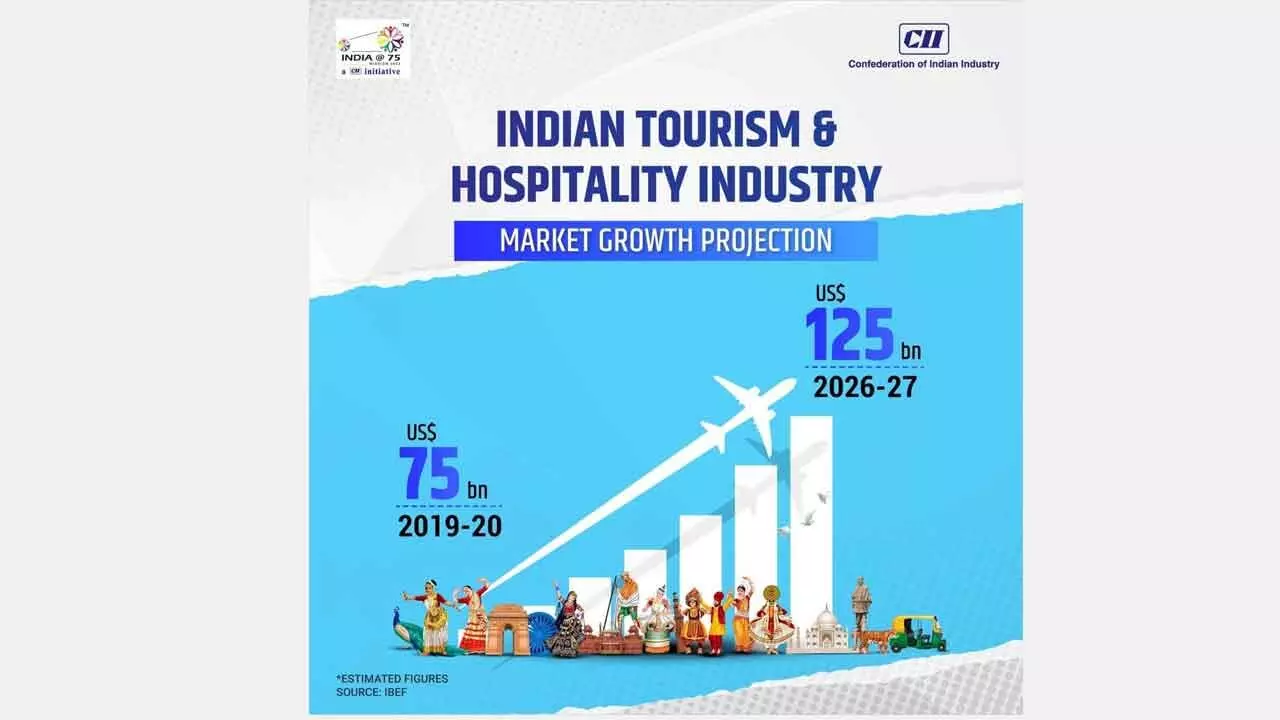The Growth Of Indian Hospitality Industry Augurs Well For Women Professionals
With a CAGR of 7.5%, the Asia-Pacific region will be one of the fastest-growing markets
The Growth Of Indian Hospitality Industry Augurs Well For Women Professionals

Hotels are increasingly feeling the pressure from nimble competitors and are challenged to find innovation partners who truly understand their business needs. Insufficient automation is a major issue, which, if addressed, can streamline operations and enhance guest experiences
The World Bank has raised India's growth forecast for the financial year 2024-25 to seven per cent, up from an earlier projection of 6.6 per cent.
The global hospitality market is expected to reach approximately $1,063 billion by 2028, growing at a CAGR of 10.24 per cent from 2022 to 2028. According to the latest statistics, this growth is and will continue to be driven by an increase in travel demand and growing rising disposable incomes.
The Asia-Pacific region is projected to reach a market size of $800 billion in 2024, reflecting robust growth driven by increased travel in China, Japan, and Southeast Asia. The region continues to benefit from rising disposable incomes and expanding tourism infrastructure. In 2023, the market was valued at $750 billion, highlighting the dynamic and rapidly evolving hospitality sector.
With a CAGR of 7.5 per cent, the Asia-Pacific region is set to be one of the fastest-growing markets, driven by increasing tourism from China and other emerging economies in the region.
In 2024, the industry will continue to rebuild the hospitality workforce. U.S. hotels are expected to directly employ more than 2.1 million people in 2024 while paying $123.4 billion in wages and salaries. Every day, hotels across the nation are helping to boost their local economies.
The projected growth of the global hospitality market is set to soar to a staggering $5,816.66 billion by 2027, with a remarkable compound annual growth rate (CAGR) of 5.5%.
The Indian hotel industry is on the verge of exponential growth, with projections indicating a 7-9 per cent revenue increase in FY2025. This surge is driven by an increase in demand for domestic leisure travel, along with a rise in events like weddings and business travel.
The market size of the hospitality industry in India is projected to be approximately $ 24.61 billion in 2024 and is anticipated to reach $ 31.01 billion by 2029. The projected growth is anticipated to occur at a CAGR of 4.73 per cent throughout the forecast period of 2024-29.
This year will see a rise in innovation, sustainability, personalization, and wellness-focused practices in the hospitality sector. Businesses may satisfy the changing needs of their guests and create a more robust and future-proof industry by adopting these trends.
Estimates for the global hospitality industry show a high estimated annual growth rate of 10.24 per cent till 2028, with many operators once again running at full capacity. That's a welcome news for hospitality job seekers.
The tourism and hospitality industry is expected to create 53 million jobs by 2029. FDI inflows in the tourism and hospitality industry reached $16.4 billion in April-June 2022. By 2028, the industry is expected to earn $50.9 billion as visitor exports compared with $28.9 billion in 2018.
Women have been playing a central role right from the Middle Age in the hospitality industry by providing services like serving meals and making beds for guests at inns. These women were often widows or unmarried, and working at inns was a way for them to support themselves and their families.
The industry is dominated by female employees, who make for an estimated 55.5 per cent of the workforce.
Among the three HTL sectors, travel has the highest gender pay gap, increasing from 20.4 per cent to 22.4 per cent over the past year. Hospitality, while relatively low compared to the broader market, has seen an increase from 4.2 per cent to 5.2 per cent.
The hospitality industry is experiencing a significant technological shift. Hotels are increasingly feeling the pressure from nimble competitors and are challenged to find innovation partners who truly understand their business needs. Insufficient automation is a major issue, which, if addressed, can streamline operations and enhance guest experiences.
Top investment areas include security and AI/automation, as the industry seeks to combat cybercrime and improve process flows. Moreover, hotels are focusing on operational efficiency to remove friction from all experiences, emphasizing that technology should serve practical purposes rather than being adopted for its own sake.
Emerging trends such as affordable luxury, wellness 2.0 and pet travel are shaping the future of hospitality, with expectations of substantial growth. Additionally, the shift towards remote work, especially among Gen Z and millennials, is influencing how hotels operate and cater to their guests.
The expansive growth across hotel companies provides tremendous opportunities within hospitality globally for women. By pursuing an education specializing in hospitality, whether at the undergraduate, graduate, or executive level, you gain key skills and global connections to reach your career aspirations.
As hospitality rebuilds, explore how you can positively impact this dynamic industry.

